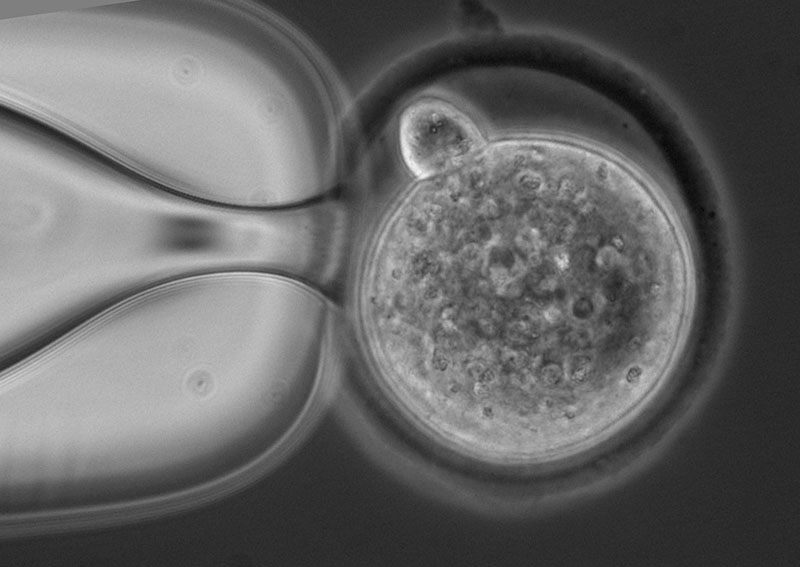 The Tulane Transgenic Core Facility provides pronuclear injection, a very common procedure used to create transgenic animals. In mice, this procedure involves collecting fertilized eggs at the single cell stage (zygote). For a brief window of time two pronuclei, one holding the genetic material from the sperm head and one from the egg, are visible within the zygote. At this stage, a linearized DNA construct is injected into one of the pronuclei. The injected eggs are then transferred into the oviducts of foster mother mice. Generally 10 to 20% of the pups born to the foster mothers have integrated the injected DNA into their genomes, thus becoming transgenic. Each pup is a unique founder mouse, as the DNA integrates randomly into the genome.
The Tulane Transgenic Core Facility provides pronuclear injection, a very common procedure used to create transgenic animals. In mice, this procedure involves collecting fertilized eggs at the single cell stage (zygote). For a brief window of time two pronuclei, one holding the genetic material from the sperm head and one from the egg, are visible within the zygote. At this stage, a linearized DNA construct is injected into one of the pronuclei. The injected eggs are then transferred into the oviducts of foster mother mice. Generally 10 to 20% of the pups born to the foster mothers have integrated the injected DNA into their genomes, thus becoming transgenic. Each pup is a unique founder mouse, as the DNA integrates randomly into the genome.
The transgenic mouse technique is the most commonly used method to study "gain-of-function" of a gene in mouse. The idea is to force expression of a gene and study its consequences. This technique addresses whether ectopic or over-expression of a gene is sufficient to cause anomalies. The facility can generate transgenic mice for your research needs. Please contact Ann Mullin with questions about pronuclear injection services.
Investigators must supply the following items:
- Digested DNA and an image of a gel verifying the construct's size and complete digestion
- Current protocol number for the transgenic pups
- IT or PO for payment
- Service Request Form
General Timeline:
- Purified DNA delivered (mice are ordered after delivery of DNA)
- Eggs injected for 2 sessions (investigator notified)
- Foster mice give birth (investigator notified)
- Tail tips given to investigator at 15-16 days
- Genotyping results are expected within 3 days of delivery of tail tips
- Pups are weaned at 21 days and transgenic pups are released to the investigator
The time from notification of beginning injections sessions to delivery of tail tips normally takes 5-8 weeks, with 2 sets of tails expected.
Special notes
The facility guarantees (within limits) the production of 3 transgenic pups per construct, however there is no guarantee that the pups produced will have germline transmission or expression of the transgene.
The facility routinely uses the inbred mouse strain C57BL/6J as the background strain. Investigators who need to use a different strain will need to cover the cost of the male mice and any additional cost for the female mice required for the procedure and pay the per diem charges for these mice.
Please have your primers ready before you receive the tail samples for genotyping. If the investigator has not contacted the facility with the results of the genotype by weaning (21 days), the investigator must pay the per diem charges for the pups. If arrangements for delivery of pups are delayed past weaning, the investigator must pay the per diem charges for the founder pups.
The investigator must inform the facility if the transgene is expected to produce severe defects or lethality, so that the pups can be properly monitored.
If your facility requires specific health tests before they will accept the transgenic pups, the investigator will pay for the cost of testing, including any shipping charges.
The investigator pays for shipping to their animal facility.
Please send an e-mail to Ann Mullin to confirm pricing information. Investigators outside the Tulane University system have an additional charge and must be at an institution based in Louisiana.
